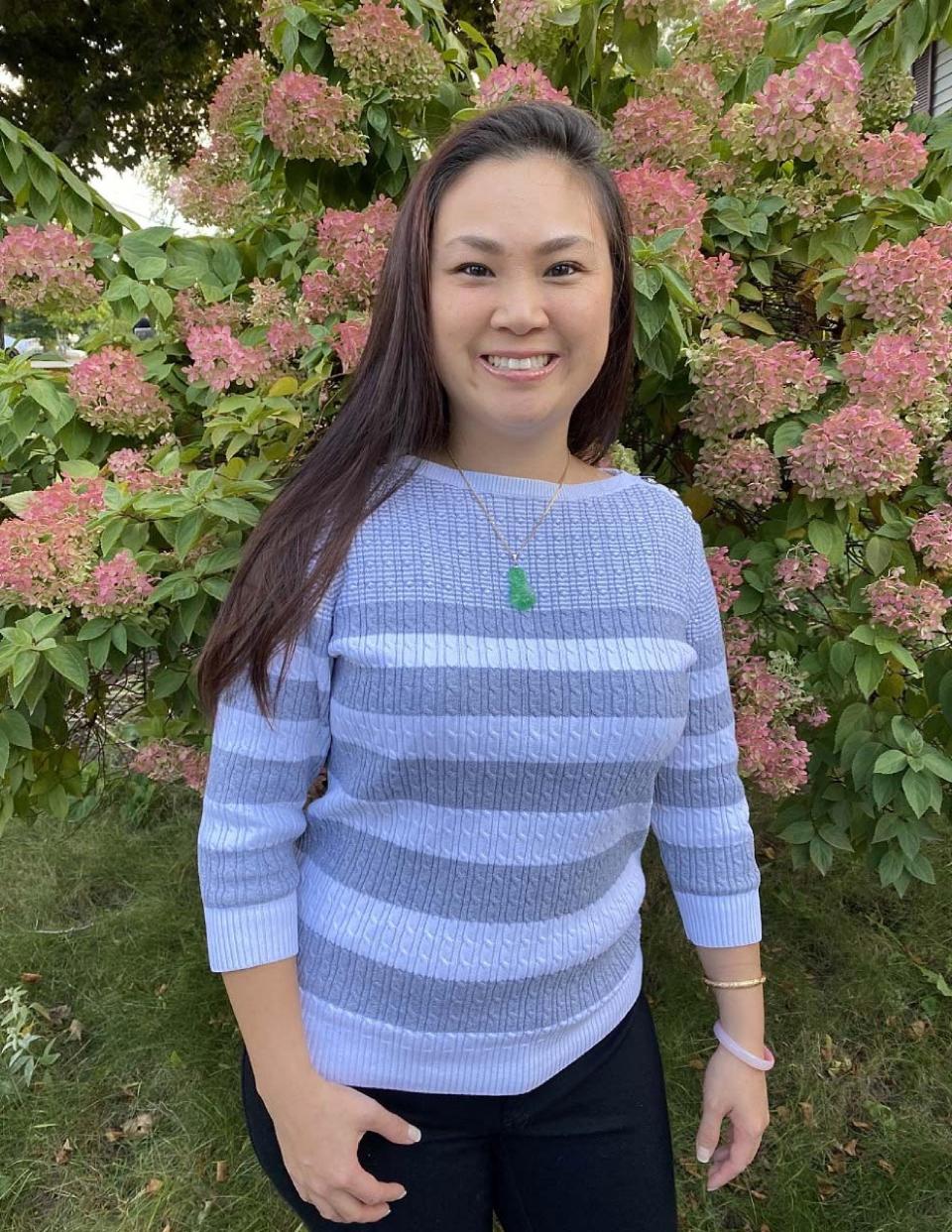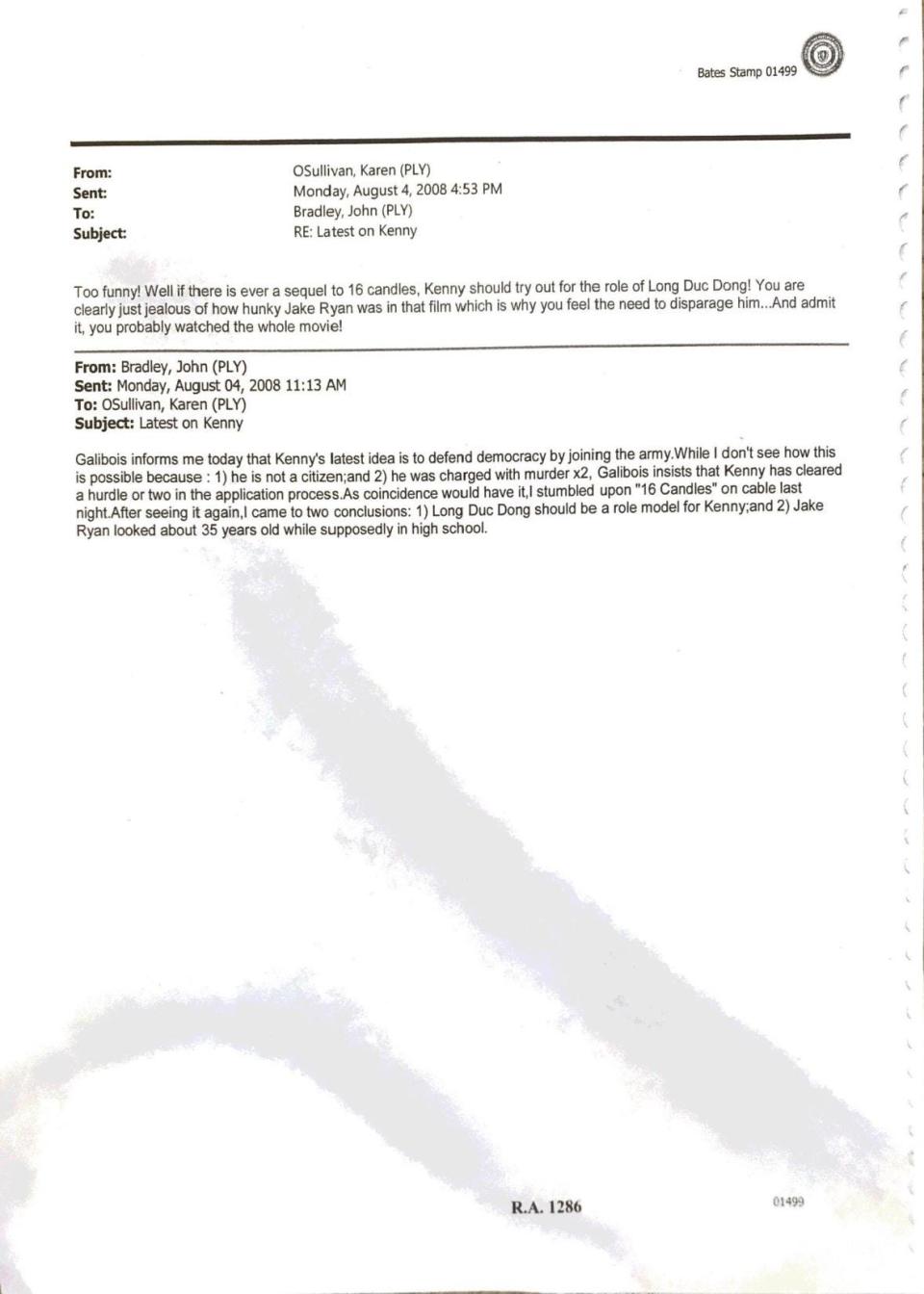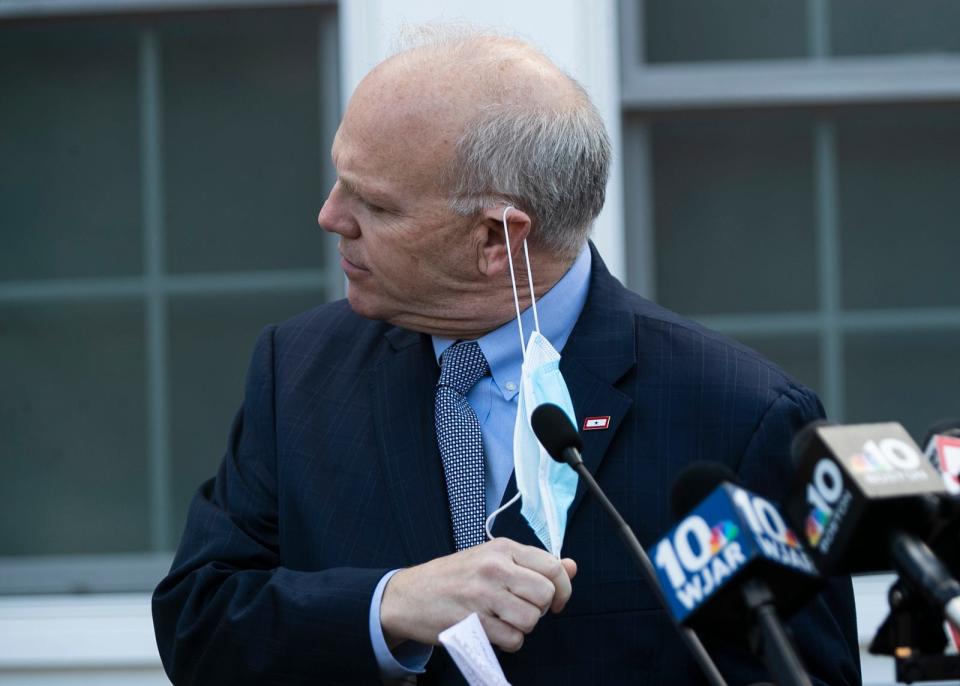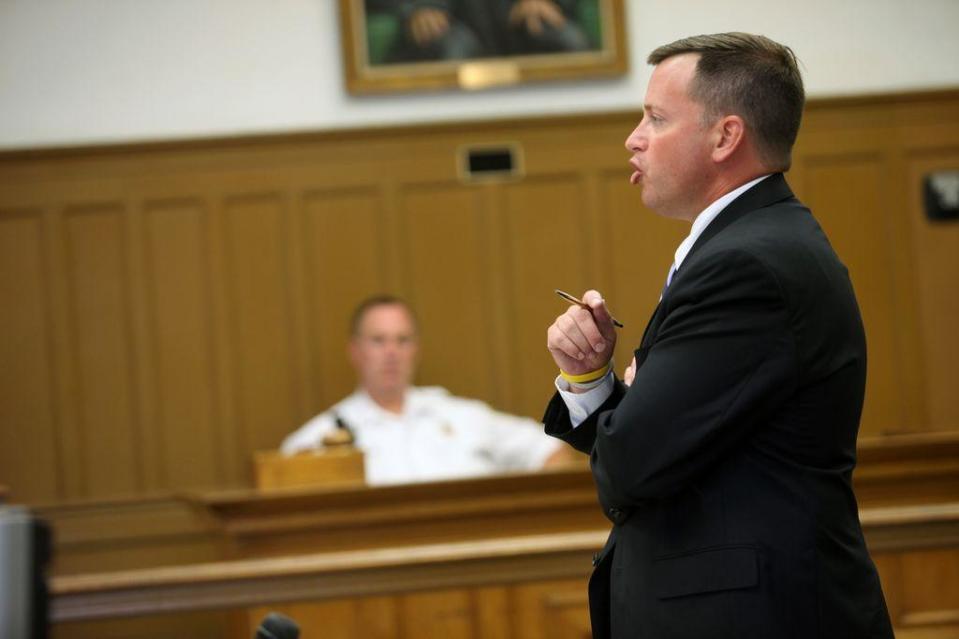These racist emails unraveled Brockton murder case — sparking cover-up, retaliation claims
BROCKTON — The controversy began with a lawsuit from a disgruntled former employee.
Veteran prosecutor John Bradley sued the Plymouth County district attorney’s office for wrongful termination, alleging his former bosses retaliated against him after he stopped volunteering time and money to District Attorney Timothy Cruz’s reelection campaigns.
The litigation lasted years, generating testimony from former prosecutors and troves of internal documents that offered an unprecedented window into the politics inside the DA’s office, the arm of state government that turns arrests into criminal convictions in Brockton and 26 towns in Plymouth County.
Among the documents entered into the public record were Bradley’s emails — thousands of them — at the former prosecutor’s own request. And while Bradley won a settlement of $250,000, the emails, which contained scores of inappropriate remarks about defendants he and his colleagues sent to prison, set off a series of unintended consequences for Bradley and the office at large.

Excerpts from Bradley’s correspondence were introduced into a pending murder case against Michael Goncalves, which ended with charges being dropped. The racially offensive remarks tarnished the reputations of several prosecutors despite recent protests from Bradley and a colleague that several of the messages had been doctored. And facing pressure from the NAACP, Cruz ordered an independent investigation into whether there was a culture of racism among his staff.
Nearly five years later, Superior Court Judge Linda Giles returned to the emails this September in a ruling that overturned the murder conviction of another Brockton resident, Frances Choy, for allegedly lighting a house fire that killed her parents in 2003.
“Newly discovered evidence of racial bias established that justice may not have been done,” wrote Giles, who’d been alerted to the emails during Choy’s appeal, and cited several other reasons for vacating the conviction.

Choy, who was tried a total of three times, was convicted and sentenced to life in prison without parole in 2011 after two mistrials. But in April, Giles stayed her sentence, freeing Choy, and in September, Giles overturned Choy's conviction. That left open the possibility that Choy could be tried a fourth time, but on Sept. 29, the DA's office declined to seek another trial.
In the buildup to Choy's appeal, her attorney John J. Barter drew connections between the dehumanizing remarks about Asians revealed in the emails and the prosecution's theory of the case. Barter argued in court filings that Bradley had exploited Asian stereotypes of emotional detachment and coldness to help secure a conviction, portraying Choy as "emotionless" or "unusually calm" seven times during his closing statement in a previous trial, and calling Choy's demeanor “the most damning evidence in this case.”
The Enterprise is publishing a selection of the emails cited by Barter, offering the public direct access to the once-private messages, which are exempt from public records laws and typically unattainable by defense attorneys unless they have prior knowledge that specific emails are relevant to their case. Several messages had previously been released in court filings but remained largely out of the public view, buried inside case files several thousands of pages long and quoted by journalists only in excerpts.
Racist emails mock defendant
Many of the emails show Bradley and his partner on the Choy case, Karen O’Sullivan — who were prosecutors on all four of Choy's trials — using Asian stereotypes to mock Choy and her nephew, Kenneth Choy, a fellow suspect in the double murder investigation who was found not guilty after a separate trial. Police had found handwritten notes in Kenneth Choy's room outlining plans to set the fire, which he claimed he transcribed and executed at his aunt's direction. He was later granted immunity by prosecutors to testify against Frances Choy.
In one exchange between prosecutors from the summer of 2008, O’Sullivan said she found a piece of clothing that Kenneth Choy left in the county jail, attaching a picture of a T-shirt featuring the character Long Duk Dong from the movie “Sixteen Candles” saying, “No more yankie my wankie.”
Bradley wrote to O’Sullivan a month later saying, “Long Duc Dong should be a role model for Kenny.”

In another email, sent on the eve of a hearing before Massachusetts’ highest court, O’Sullivan wrote that she “will show up tomorrow wearing a cheongsam and will be the one doing origami in the back of the court room.”
A few months earlier, O’Sullivan had remarked that Kenneth Choy was having a baby. Bradley asked who the “lucky mom” is, to which O’Sullivan responded “Frances.”
O'Sullivan and Bradley have claimed the previous two exchanges were altered by the Plymouth DA's office as retaliation against them, allegations which the DA vehemently denies.
In still another set of contested emails, prosecutors discussed dropping France Choy’s case in the face of new evidence, more than a decade before their supervisors did exactly that. In September 2009, shortly after Kenneth Choy's release from county jail, a second fire broke out at the home on Belair Street where Frances Choy had been accused of killing her parents. Frances Choy was still incarcerated at the time.
Responding to a news report about the suspected arson, O’Sullivan wrote to Bradley, “I think you should NP Frances’s case right now,” using an abbreviation for nolle prosequi, the legal term for dropping criminal charges. But far from dropping the case, Plymouth County prosecutors proceeded to try Frances Choy two more times. Bradley joked in an email to O'Sullivan that it was Frances Choy's own defense attorney who lit the second fire.
It wasn’t until Sept. 29 that the Plymouth County DA's office actually filed that nolle prosequi, effectively dropping the case against Frances Choy, now 34, who had spent 17 years behind bars and under house arrest. By that time, O’Sullivan had left the office to become a lead prosecutor in neighboring Bristol County.
Report finds 'no evidence of culture of racism'
During the frenzy of media attention that followed Frances Choy’s release, the Plymouth County district attorney condemned Bradley and O’Sullivan’s conduct, seeking to distance the racist emails from the public perception of the office he’d run since 2001.
“Immediately after we became aware of the inappropriate emails, we hired an independent investigative firm, Guidepost Solutions, LLC, to conduct a detailed review of over 380,000 emails and attachments issued and received by our staff over an approximately 11-year period,” Cruz said in a written statement to The Enterprise.

Guidepost, a global technology compliance and security firm, conducted the evaluation under the leadership of former U.S. Marshal Nancy McGillivray, who served as project manager, the DA's office said.
“Guidepost found no evidence of a culture of racism in our office after concluding its review of the email system,” he added.
'Garbage in and garbage out'?
But Bradley, and O'Sullivan, through her attorney Mike Mone, as well as former Plymouth County prosecutor Gail McKenna have alleged there were glaring flaws in the report's production that allowed the DA's office to cover up other misconduct that might otherwise have been exposed.
A version of the report shared by the DA concluded that a staff of more than 100 employees exchanged nine racist emails between 2004 and 2015. All of the inappropriate emails had already been publicly released, according to Cruz.
But McKenna said employees had enough heads up about the investigation to clear out their inboxes as they saw fit, rendering the report's limited findings “completely worthless.” Bradley said he heard the same story from former colleagues who stayed at the office.
“This investigation that (the DA) bought and paid for was a sham,” Bradley said. “Everyone knew what was coming so all they did was delete the emails.”
McKenna also alleged that leaders in Cruz’s office had the opportunity to screen the email archive on their own before handing it over to Guidepost.
“They cherrypicked what they gave to Guidepost,” she said. “If you’re in control of what information you give to your investigator, it’s garbage in and garbage out.”
But Beth Stone, a spokesperson for the Plymouth County DA's office, said McKenna "was not involved at all with Guidepost's exhaustive, independent evaluation or the process."
"Her allegations that employees were given advance notice to delete emails, or that our office screened emails as part of Guidepost's audit, have no merit whatsoever," Stone said.
But McKenna disputes that.
"Cruz’s contention that I was not involved in any part of the Guidepost examination is completely false. I was asked to assist in the Guidepost examination by providing 'search terms' for Guidepost to use. It was common knowledge among employees that Cruz hired a firm to examine the email system," McKenna told The Enterprise.
McKenna pointed to an April 2015 public announcement by Cruz prior to the Guidepost study in which he vowed to initiate an outside investigation of the emails as evidence that employees knew what was coming.
Do the numbers add up?
The number of unique emails Guidepost downloaded for review after eliminating duplicates — 101,814 — suggests the scope of the emails submitted for the investigation was narrow.
In 2015, the year the firm was hired, the Plymouth County DA's office employed 138 people, according to a database of state employee salaries.
Assuming similar staffing levels over the approximately 11-year period Guidepost studied, that would mean that on average each employee sent fewer than two emails per week.
Stone did not specifically respond to questions from The Enterprise about whether employees did indeed send fewer than two emails per week during that time.
Former prosecutors say emails were tampered with
Bradley, who became a prosecutor in Worcester County before retiring to run unsuccessfully against Cruz in 2018, recently told The Enterprise the emails attributed to him and O'Sullivan were altered by their former supervisors "because they hated us and wanted to harm us in any way they could.”
Bradley added that many of the racist emails attributed to him and O’Sullivan were forwarded around the DA’s office, yet few email addresses except their own were left unredacted.
“There are so many names blacked out,” Bradley said. “I’m sure some of them if not all of them are still working there.”
But Stone said any redacted email addresses were for employees who "received the disparaging emails and did not request or respond to them."
O’Sullivan, who left the Plymouth DA’s office voluntarily not long after Bradley’s termination in 2012, is now a high-ranking prosecutor in Bristol County District Attorney Thomas Quinn's office. She provided a statement to The Enterprise shortly after Frances Choy’s convictions were vacated.
“The vast majority of the emails referenced in the Court’s decision are emails that I have never seen before and I have no recollection of ever sending or receiving,” O’Sullivan said. “I do not believe these emails are authentic and were created or altered prior to their release to the Court. It is important to note that all of the emails were provided by the PCDAO (Plymouth County district attorney's office) and have never been authenticated.”
Quinn has defended O’Sullivan throughout several waves of criticism regarding the emails.
“I have gotten to know Karen during the past eight years and have found her to be a person of high moral character and integrity,” Quinn said in a recent statement. “There has not been a single complaint about Karen's professionalism, conduct or attitude during the time she has served the people of Bristol County.”
He added, “It is clear there is a dispute regarding the authenticity of the emails.”
But Stone called claims by Bradley and O'Sullivan that the emails had been tampered with "ludicrous."
"Any assertions that these emails have somehow been 'altered' or 'never seen before' by their authors is ludicrous," Stone said.
Claims of cover-ups and retaliation
McKenna, who shared Bradley's and O'Sullivan's emails with Frances Choy's defense team as post-conviction evidence, said an additional 61 emails Guidepost flagged as inappropriate were never made available to her despite frequent requests, according to a complaint she later filed with the Massachusetts Commission Against Discrimination.
McKenna said she sought to make disclosures in several pending cases about the racial biases and inappropriate behavior revealed in prosecutors' emails, a suggestion McKenna said drew criticism from her supervisors.
McKenna, fired in 2019 while Frances Choy's case was still being appealed, provided email records to The Enterprise showing the DA's office instructed her to minimize the number of inappropriate emails disclosed to defense attorneys and released into public case files.
Thomas Flanagan, then a high-ranking Plymouth County prosecutor, wrote an email to McKenna in March 2017 saying of Plymouth County DA Timothy Cruz, “Tim’s position is that we should only reference materials/facts/issues developed in the federal lawsuit if it is absolutely necessary and if it draws from documents that are confirmed with certainty as being publicly available documents.”

In a previous email, Flanagan had relayed another message from the DA.
“Tim advised that he does not want the characterization 'racist' used in the response to describe the emails,” Flanagan said to McKenna.
McKenna responded sternly, warning that the office could be reprimanded by the judge and damage future cases if they failed to make the appropriate disclosures.
She said, "To now continue in this same vein, and fail to make full disclosures to court will severely prejudice this office in the litigation of this case, and future cases."
In a response to an Enterprise inquiry about the emails involving Flanagan, Stone said, "We cannot contextualize and will not comment on any personal emails that have allegedly been obtained by McKenna and shared with The Enterprise."
But Stone said it was McKenna who failed to produce discovery materials to defense counsel — while McKenna maintains she was retaliated against by the DA's office precisely because she insisted on doing so.
"Former employee Gail McKenna was terminated after repeated instances of insubordinate and unprofessional behavior, abandoning her duties as an Assistant District Attorney, her responsibilities as Chief of the Appeals Unit, and her obligations to her colleagues as a prosecutor and an attorney. As in the Choy First Degree Murder case, McKenna failed to produce discovery materials to defense counsel," Stone said.
But McKenna said just the opposite is true.
"Timothy Cruz and his close associate, Michael Horan, accused me of ruining his Office and causing the NAACP to march against him after I exposed the racist, sexist, homophobic, and inappropriate emails shared between employees," McKenna recently told The Enterprise.
She said she worked for the state for 30 years, 22 at the DA's office, and was blindsided when she was fired because she had an "unblemished record" and had never been disciplined.
"Cruz continues to retaliate against me as evidenced by the uncommon and bizarre vitriol and the falsehoods contained in his statements to the Enterprise," she said.
But Stone said Bradley's, O'Sullivan's and McKenna's allegations "are meritless and are disproved by the facts."
"That former employees who engaged in this conduct or who failed and refused to obey court orders to disclose those emails are now trying to cover up their own misconduct is no surprise. We are surprised however, that these false, defamatory and scurrilous accusations of racism or a cover-up by this office are news to The Enterprise," Stone said.
Methodology matters
Jason Nickola, chief operating officer and senior security specialist at New-Hampshire-based Pulsar Security, said it’s impossible to evaluate what's authentic when it comes to the emails without a forensic investigation, which would require access to several accounts and mail servers.
He said the Guidepost report is very unclear about how these emails were stored and there is no way of knowing — based on what they've said in their report about their methodology — whether they had access to a complete archive of the office’s emails over the 11-year time span in question.
He said the "volume" of emails is a good indicator of how much got stored.
The DA's office did not respond to further inquiries about the material submitted to Guidepost for investigation or the inappropriate emails flagged by the firm. A Guidepost spokesperson referred all inquiries to the district attorney.
Implications for other cases — particularly in communities of color
Rahsaan Hall, director of the ACLU of Massachusetts' racial justice program and a former Suffolk County prosecutor, says the possibility that additional racist emails were concealed by the DA's office has major implications for other defendants, whose attorneys could potentially use those emails to work toward their exoneration.
In the Frances Choy case, for instance, Judge Giles wrote that if she had been aware of the emails during previous trials, "this Court would have declared a mistrial and directed that those Assistant District Attorneys be removed from the case."
Hall said finding more racist emails could unravel more wrongful convictions.
"The allegations that staff were able to remove potentially incriminating emails is disturbing, if true," Hall said. "It raises serious concerns about the integrity of the investigations, prosecutions, and appeals -- particularly for cases emanating from communities of color."
Cruz, in a statement released through Stone spokesperson, said his office is examining other murder cases prosecuted by Bradley and O'Sullivan.
With Enterprise staff reports.
This article originally appeared on The Enterprise: Brockton Choy murder case: Racist emails between prosecutors exposed

